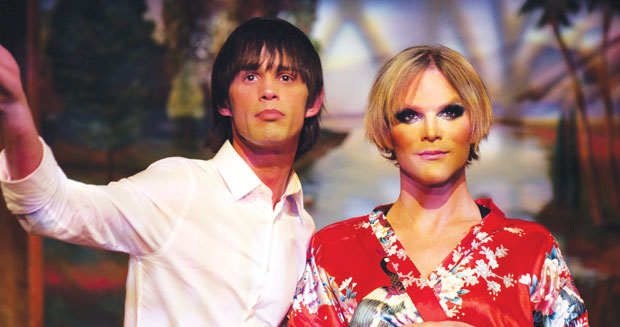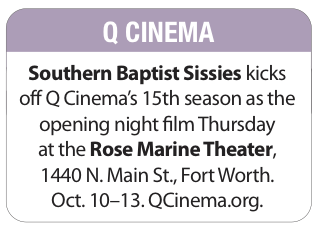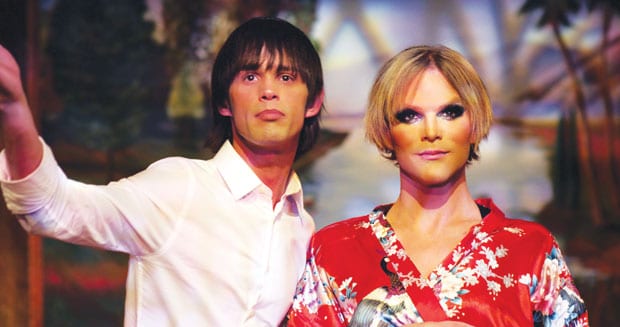Q Cinema opening night film ‘Southern Baptist Sissies’ captures the show’s intimacy

HOLY ROLLERS | Mark (Emerson Collins) and Benny (Willam Belli) cope with sex and religion in their own ways.
ARNOLD WAYNE JONES | Life+Style Editor
 Like Tom in Tennessee Williams’ Glass Menagerie, the primary narrator of Southern Baptist Sissies, Mark (Emerson Collins), tells his story through the foggy parallax of memory. He recounts that innocent time from tween to teen when he and three peers — best friend TJ (Luke Stratte-McClure), simple Andrew (Matthew Scott Montgomery) and flamboyant budding drag queen Benny (Willam Belli, of Ticked Off Trannies and RuPaul’s Drag Race) — dealt with the complex emotions of burgeoning sexuality in the context of a repressive church environment. Such conflicts can never end well.
Like Tom in Tennessee Williams’ Glass Menagerie, the primary narrator of Southern Baptist Sissies, Mark (Emerson Collins), tells his story through the foggy parallax of memory. He recounts that innocent time from tween to teen when he and three peers — best friend TJ (Luke Stratte-McClure), simple Andrew (Matthew Scott Montgomery) and flamboyant budding drag queen Benny (Willam Belli, of Ticked Off Trannies and RuPaul’s Drag Race) — dealt with the complex emotions of burgeoning sexuality in the context of a repressive church environment. Such conflicts can never end well.
At least they don’t when Del Shores is writing and directing. It’s gotten to where you can hardly differentiate Shores-the-playwright from Shores-the-gay-damaged-former-Baptist. Film and theater have become a form of public therapy for him, working out issues related to the homophobia and hypocrisy of the church while sharing his coping mechanisms with others similarly scarred in the name of religion.
Sometimes, it all comes across as heavy-handed (he’s not really subtle with his imagery, such as two boys having sex while their writhing hands clutch a huge crucifix).
More often than not in his shows, someone dies or commits suicide while a piano solo plays languidly in the background. But Shores also knows how to pivot from hilarious one-liners to pungent, painful silences without giving you whiplash. Sometimes, sharp observations cross over into mawkish melodrama, but usually the emotions feel earned.
Consider the characters that resonate most strongly as fully-formed people: Odette and Peanut, played by Shores veterans (and comedy icons) Dale Dickey and Leslie Jordan. They play two drunken barflies lurking around some nameless gay piano bar for backsliding Baptists (“I’m not a lesbian — I’m an alcoholic,” Odette clarifies).
They share witty, withering observations: About the rough trade in the bar (most of whom Peanut seems unusually familiar with), about their own sordid, shadowy histories (Odette recalls an endless series of “unfortunate incidents I’d rather not discuss right now”), about their relationships with the church. Dickey and Jordan’s expert timing and palpable chemistry allow them to toggle effortlessly from sardonic bitterness to heartbreaking anguish without losing the audience.
But while these peripheral characters carry much of the comedy, the boys provide the plot’s impetus as they explore (sometimes with pretty explicit nudity and sex) their urges, and the effects it has on them.
Unlike, say, Sordid Lives, SBS is basically a filmed stage production (you can see the audience members; they are seated in pews). The technique melds the intimacy of film with the spontaneity of theater; there’s an immediacy to the action that doesn’t seem false, merely stylized.
Southern Baptist Sissies is a movie chockfull of specificity, from the hymns to the Bible verses to the numerous Dallas-based references (Cedar Springs, the Rose Room… even Dallas Voice), and Shores has updated a lot of the dialogue to provide a structure around which the actors — all of them quite good — tap into archetypical issues of confusion familiar to many gay people, such as rationalizing how fooling around with another man doesn’t make you gay (you can’t be gay — you’re Christian!). If just the idea of that hits home with you, you’re exactly who should be seeing this movie.
This article appeared in the Dallas Voice print edition October 4, 2013.











